Case Study on Interdisciplinary Team Approach to Patient Care
VerifiedAdded on 2023/03/23
|8
|2230
|46
Case Study
AI Summary
This case study focuses on Rob, a patient with type 2 diabetes and suspected dementia, emphasizing the necessity of an interdisciplinary care approach. It identifies Rob as the primary client, detailing his health issues and the concerns arising from his condition, including high blood sugar levels and behavioral changes. The study outlines the roles of various healthcare professionals within the interdisciplinary team—including nurse practitioners, general practitioners, neurologists, social workers, and dieticians—and their respective contributions to Rob's care. It also addresses key considerations for each team member, such as the patient's mental state, age, and social isolation. The study recommends home health care services as a beneficial care option, highlighting its effectiveness in managing Rob's diabetes and addressing his dementia-related challenges. The case study concludes by stressing the importance of effective interpersonal communication and clearly defined roles within the team to ensure quality patient care and improve the patient's overall quality of life.

Running head: PATIENT CARE
Patient Care
Name of the Student
Name of the University
Author Note
Patient Care
Name of the Student
Name of the University
Author Note
Paraphrase This Document
Need a fresh take? Get an instant paraphrase of this document with our AI Paraphraser
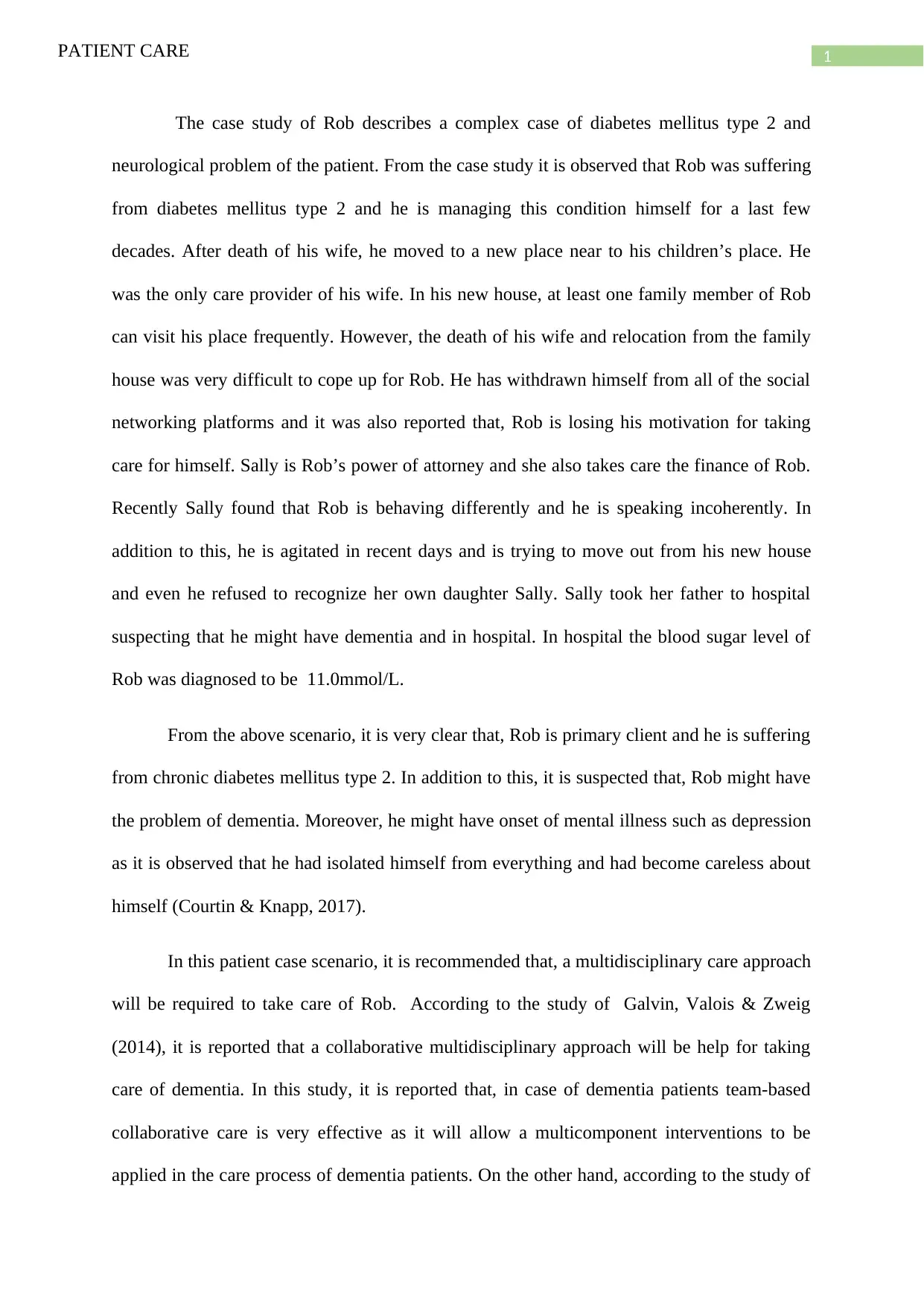
1PATIENT CARE
The case study of Rob describes a complex case of diabetes mellitus type 2 and
neurological problem of the patient. From the case study it is observed that Rob was suffering
from diabetes mellitus type 2 and he is managing this condition himself for a last few
decades. After death of his wife, he moved to a new place near to his children’s place. He
was the only care provider of his wife. In his new house, at least one family member of Rob
can visit his place frequently. However, the death of his wife and relocation from the family
house was very difficult to cope up for Rob. He has withdrawn himself from all of the social
networking platforms and it was also reported that, Rob is losing his motivation for taking
care for himself. Sally is Rob’s power of attorney and she also takes care the finance of Rob.
Recently Sally found that Rob is behaving differently and he is speaking incoherently. In
addition to this, he is agitated in recent days and is trying to move out from his new house
and even he refused to recognize her own daughter Sally. Sally took her father to hospital
suspecting that he might have dementia and in hospital. In hospital the blood sugar level of
Rob was diagnosed to be 11.0mmol/L.
From the above scenario, it is very clear that, Rob is primary client and he is suffering
from chronic diabetes mellitus type 2. In addition to this, it is suspected that, Rob might have
the problem of dementia. Moreover, he might have onset of mental illness such as depression
as it is observed that he had isolated himself from everything and had become careless about
himself (Courtin & Knapp, 2017).
In this patient case scenario, it is recommended that, a multidisciplinary care approach
will be required to take care of Rob. According to the study of Galvin, Valois & Zweig
(2014), it is reported that a collaborative multidisciplinary approach will be help for taking
care of dementia. In this study, it is reported that, in case of dementia patients team-based
collaborative care is very effective as it will allow a multicomponent interventions to be
applied in the care process of dementia patients. On the other hand, according to the study of
The case study of Rob describes a complex case of diabetes mellitus type 2 and
neurological problem of the patient. From the case study it is observed that Rob was suffering
from diabetes mellitus type 2 and he is managing this condition himself for a last few
decades. After death of his wife, he moved to a new place near to his children’s place. He
was the only care provider of his wife. In his new house, at least one family member of Rob
can visit his place frequently. However, the death of his wife and relocation from the family
house was very difficult to cope up for Rob. He has withdrawn himself from all of the social
networking platforms and it was also reported that, Rob is losing his motivation for taking
care for himself. Sally is Rob’s power of attorney and she also takes care the finance of Rob.
Recently Sally found that Rob is behaving differently and he is speaking incoherently. In
addition to this, he is agitated in recent days and is trying to move out from his new house
and even he refused to recognize her own daughter Sally. Sally took her father to hospital
suspecting that he might have dementia and in hospital. In hospital the blood sugar level of
Rob was diagnosed to be 11.0mmol/L.
From the above scenario, it is very clear that, Rob is primary client and he is suffering
from chronic diabetes mellitus type 2. In addition to this, it is suspected that, Rob might have
the problem of dementia. Moreover, he might have onset of mental illness such as depression
as it is observed that he had isolated himself from everything and had become careless about
himself (Courtin & Knapp, 2017).
In this patient case scenario, it is recommended that, a multidisciplinary care approach
will be required to take care of Rob. According to the study of Galvin, Valois & Zweig
(2014), it is reported that a collaborative multidisciplinary approach will be help for taking
care of dementia. In this study, it is reported that, in case of dementia patients team-based
collaborative care is very effective as it will allow a multicomponent interventions to be
applied in the care process of dementia patients. On the other hand, according to the study of
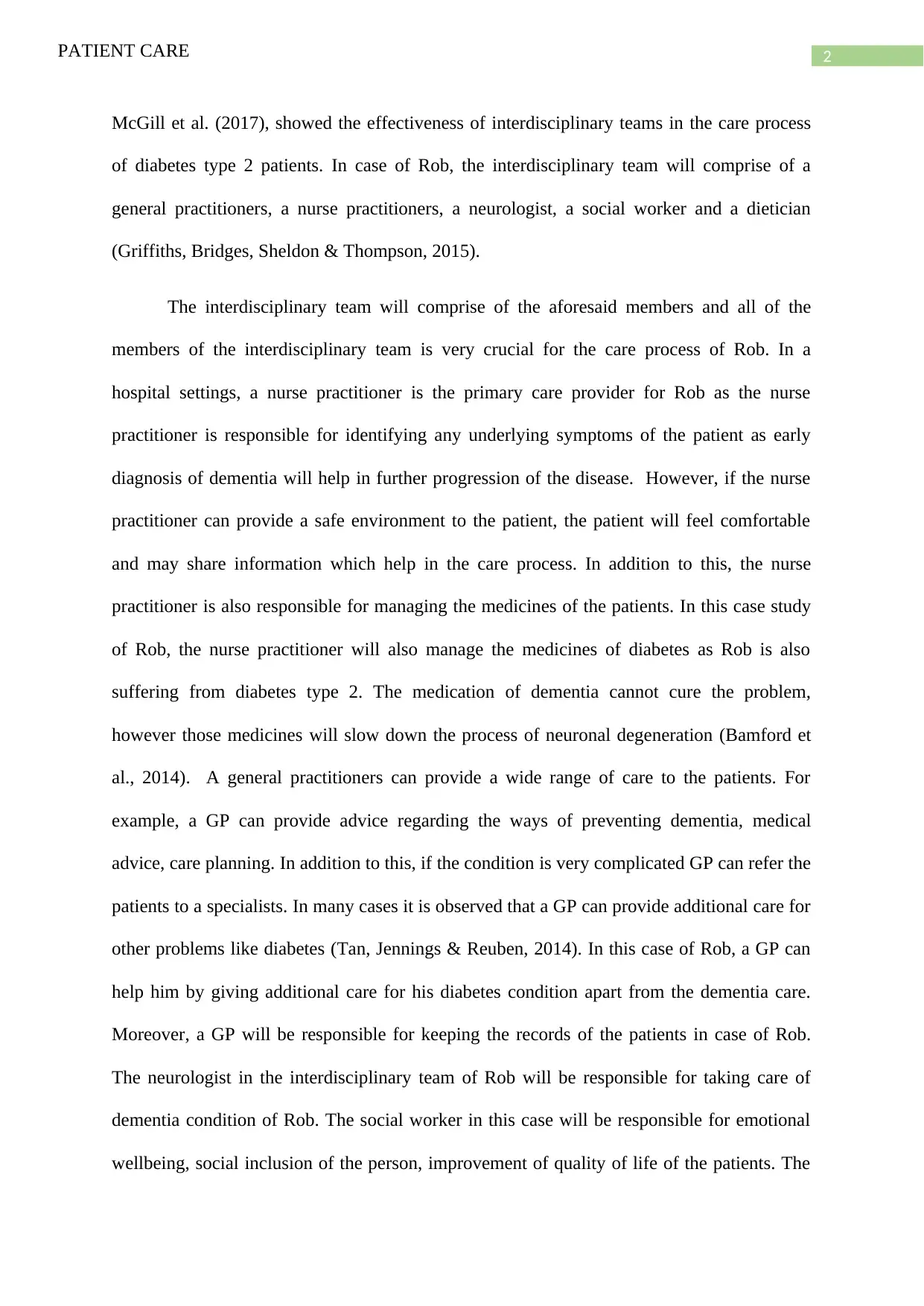
2PATIENT CARE
McGill et al. (2017), showed the effectiveness of interdisciplinary teams in the care process
of diabetes type 2 patients. In case of Rob, the interdisciplinary team will comprise of a
general practitioners, a nurse practitioners, a neurologist, a social worker and a dietician
(Griffiths, Bridges, Sheldon & Thompson, 2015).
The interdisciplinary team will comprise of the aforesaid members and all of the
members of the interdisciplinary team is very crucial for the care process of Rob. In a
hospital settings, a nurse practitioner is the primary care provider for Rob as the nurse
practitioner is responsible for identifying any underlying symptoms of the patient as early
diagnosis of dementia will help in further progression of the disease. However, if the nurse
practitioner can provide a safe environment to the patient, the patient will feel comfortable
and may share information which help in the care process. In addition to this, the nurse
practitioner is also responsible for managing the medicines of the patients. In this case study
of Rob, the nurse practitioner will also manage the medicines of diabetes as Rob is also
suffering from diabetes type 2. The medication of dementia cannot cure the problem,
however those medicines will slow down the process of neuronal degeneration (Bamford et
al., 2014). A general practitioners can provide a wide range of care to the patients. For
example, a GP can provide advice regarding the ways of preventing dementia, medical
advice, care planning. In addition to this, if the condition is very complicated GP can refer the
patients to a specialists. In many cases it is observed that a GP can provide additional care for
other problems like diabetes (Tan, Jennings & Reuben, 2014). In this case of Rob, a GP can
help him by giving additional care for his diabetes condition apart from the dementia care.
Moreover, a GP will be responsible for keeping the records of the patients in case of Rob.
The neurologist in the interdisciplinary team of Rob will be responsible for taking care of
dementia condition of Rob. The social worker in this case will be responsible for emotional
wellbeing, social inclusion of the person, improvement of quality of life of the patients. The
McGill et al. (2017), showed the effectiveness of interdisciplinary teams in the care process
of diabetes type 2 patients. In case of Rob, the interdisciplinary team will comprise of a
general practitioners, a nurse practitioners, a neurologist, a social worker and a dietician
(Griffiths, Bridges, Sheldon & Thompson, 2015).
The interdisciplinary team will comprise of the aforesaid members and all of the
members of the interdisciplinary team is very crucial for the care process of Rob. In a
hospital settings, a nurse practitioner is the primary care provider for Rob as the nurse
practitioner is responsible for identifying any underlying symptoms of the patient as early
diagnosis of dementia will help in further progression of the disease. However, if the nurse
practitioner can provide a safe environment to the patient, the patient will feel comfortable
and may share information which help in the care process. In addition to this, the nurse
practitioner is also responsible for managing the medicines of the patients. In this case study
of Rob, the nurse practitioner will also manage the medicines of diabetes as Rob is also
suffering from diabetes type 2. The medication of dementia cannot cure the problem,
however those medicines will slow down the process of neuronal degeneration (Bamford et
al., 2014). A general practitioners can provide a wide range of care to the patients. For
example, a GP can provide advice regarding the ways of preventing dementia, medical
advice, care planning. In addition to this, if the condition is very complicated GP can refer the
patients to a specialists. In many cases it is observed that a GP can provide additional care for
other problems like diabetes (Tan, Jennings & Reuben, 2014). In this case of Rob, a GP can
help him by giving additional care for his diabetes condition apart from the dementia care.
Moreover, a GP will be responsible for keeping the records of the patients in case of Rob.
The neurologist in the interdisciplinary team of Rob will be responsible for taking care of
dementia condition of Rob. The social worker in this case will be responsible for emotional
wellbeing, social inclusion of the person, improvement of quality of life of the patients. The
⊘ This is a preview!⊘
Do you want full access?
Subscribe today to unlock all pages.

Trusted by 1+ million students worldwide
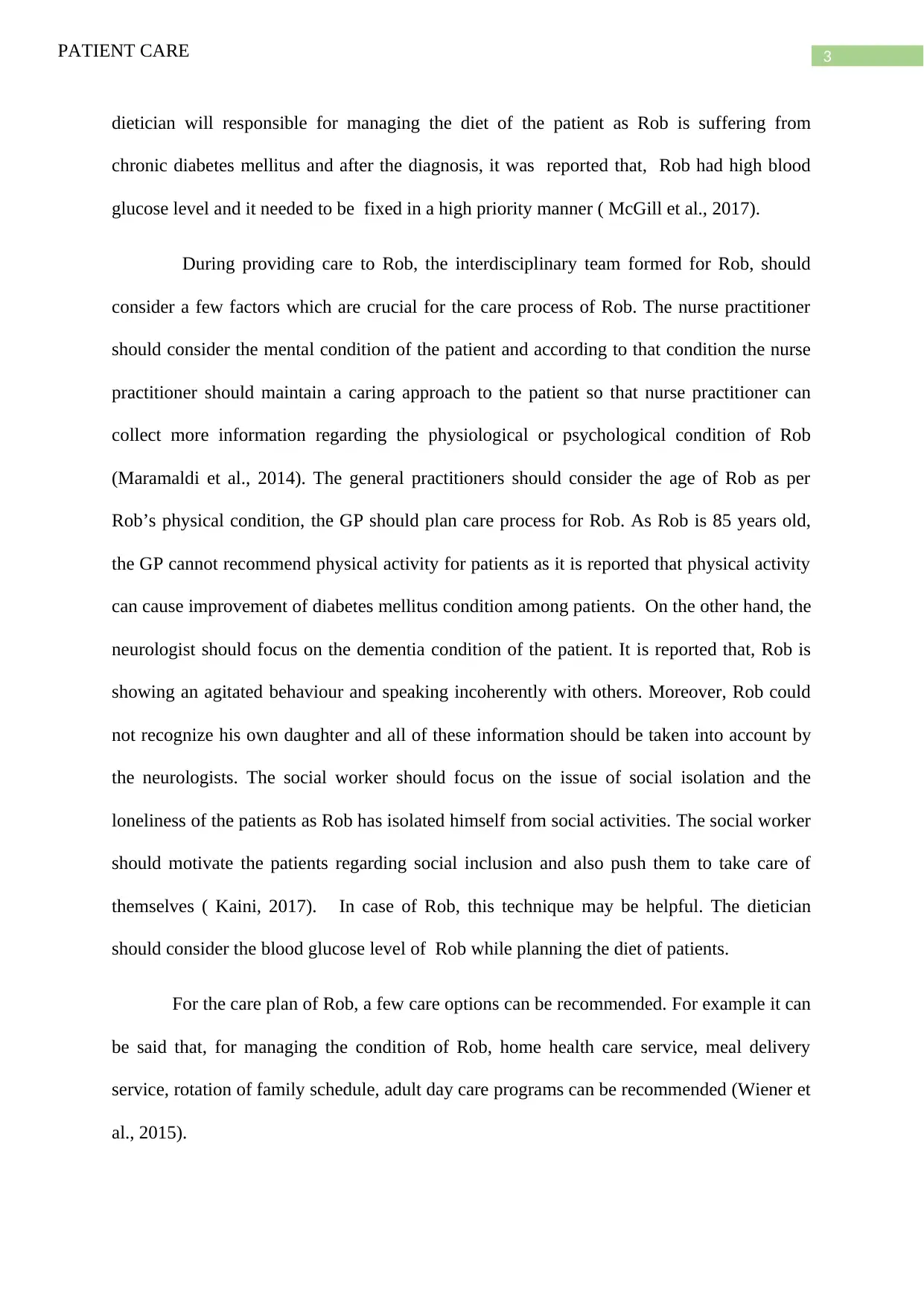
3PATIENT CARE
dietician will responsible for managing the diet of the patient as Rob is suffering from
chronic diabetes mellitus and after the diagnosis, it was reported that, Rob had high blood
glucose level and it needed to be fixed in a high priority manner ( McGill et al., 2017).
During providing care to Rob, the interdisciplinary team formed for Rob, should
consider a few factors which are crucial for the care process of Rob. The nurse practitioner
should consider the mental condition of the patient and according to that condition the nurse
practitioner should maintain a caring approach to the patient so that nurse practitioner can
collect more information regarding the physiological or psychological condition of Rob
(Maramaldi et al., 2014). The general practitioners should consider the age of Rob as per
Rob’s physical condition, the GP should plan care process for Rob. As Rob is 85 years old,
the GP cannot recommend physical activity for patients as it is reported that physical activity
can cause improvement of diabetes mellitus condition among patients. On the other hand, the
neurologist should focus on the dementia condition of the patient. It is reported that, Rob is
showing an agitated behaviour and speaking incoherently with others. Moreover, Rob could
not recognize his own daughter and all of these information should be taken into account by
the neurologists. The social worker should focus on the issue of social isolation and the
loneliness of the patients as Rob has isolated himself from social activities. The social worker
should motivate the patients regarding social inclusion and also push them to take care of
themselves ( Kaini, 2017). In case of Rob, this technique may be helpful. The dietician
should consider the blood glucose level of Rob while planning the diet of patients.
For the care plan of Rob, a few care options can be recommended. For example it can
be said that, for managing the condition of Rob, home health care service, meal delivery
service, rotation of family schedule, adult day care programs can be recommended (Wiener et
al., 2015).
dietician will responsible for managing the diet of the patient as Rob is suffering from
chronic diabetes mellitus and after the diagnosis, it was reported that, Rob had high blood
glucose level and it needed to be fixed in a high priority manner ( McGill et al., 2017).
During providing care to Rob, the interdisciplinary team formed for Rob, should
consider a few factors which are crucial for the care process of Rob. The nurse practitioner
should consider the mental condition of the patient and according to that condition the nurse
practitioner should maintain a caring approach to the patient so that nurse practitioner can
collect more information regarding the physiological or psychological condition of Rob
(Maramaldi et al., 2014). The general practitioners should consider the age of Rob as per
Rob’s physical condition, the GP should plan care process for Rob. As Rob is 85 years old,
the GP cannot recommend physical activity for patients as it is reported that physical activity
can cause improvement of diabetes mellitus condition among patients. On the other hand, the
neurologist should focus on the dementia condition of the patient. It is reported that, Rob is
showing an agitated behaviour and speaking incoherently with others. Moreover, Rob could
not recognize his own daughter and all of these information should be taken into account by
the neurologists. The social worker should focus on the issue of social isolation and the
loneliness of the patients as Rob has isolated himself from social activities. The social worker
should motivate the patients regarding social inclusion and also push them to take care of
themselves ( Kaini, 2017). In case of Rob, this technique may be helpful. The dietician
should consider the blood glucose level of Rob while planning the diet of patients.
For the care plan of Rob, a few care options can be recommended. For example it can
be said that, for managing the condition of Rob, home health care service, meal delivery
service, rotation of family schedule, adult day care programs can be recommended (Wiener et
al., 2015).
Paraphrase This Document
Need a fresh take? Get an instant paraphrase of this document with our AI Paraphraser
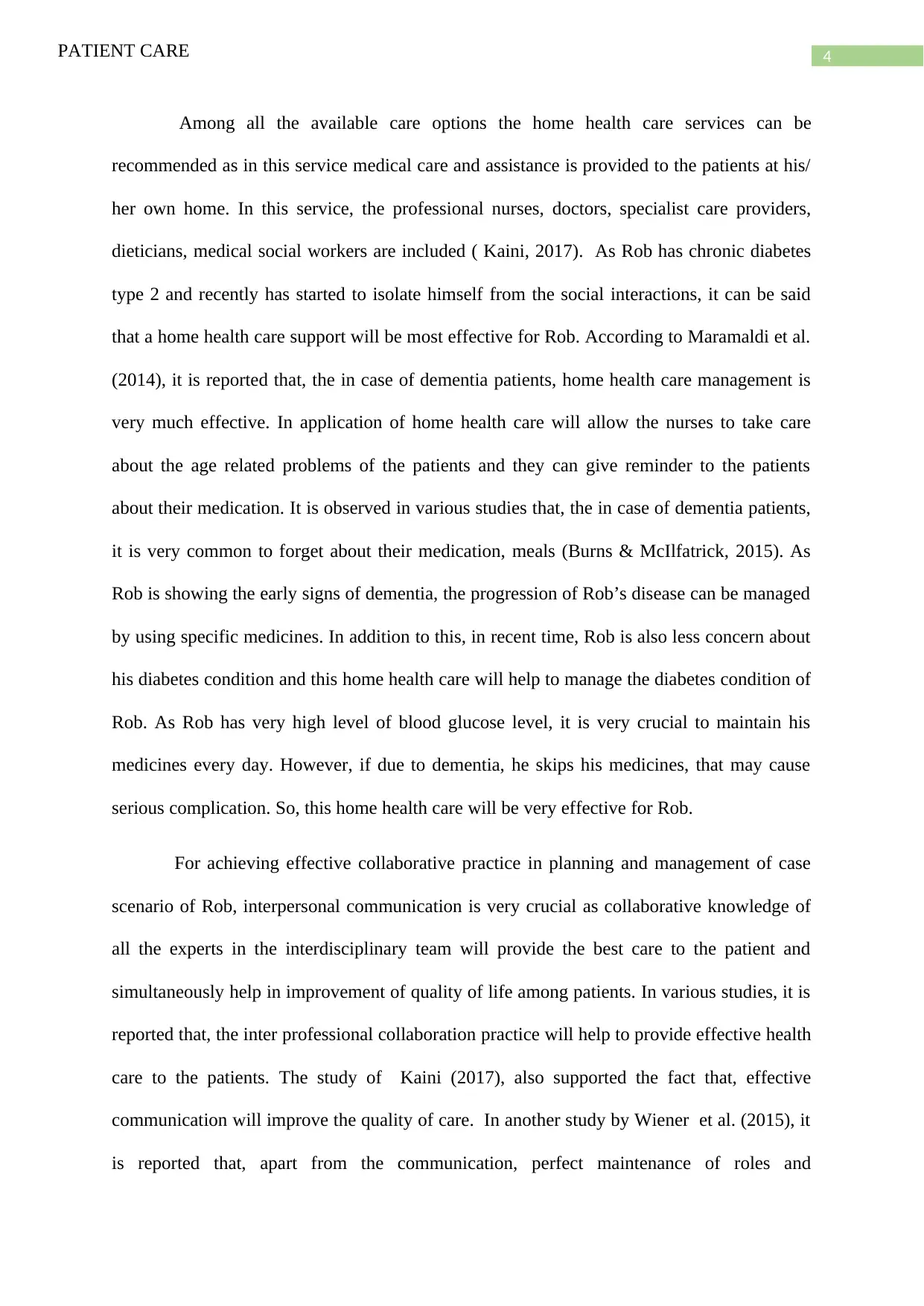
4PATIENT CARE
Among all the available care options the home health care services can be
recommended as in this service medical care and assistance is provided to the patients at his/
her own home. In this service, the professional nurses, doctors, specialist care providers,
dieticians, medical social workers are included ( Kaini, 2017). As Rob has chronic diabetes
type 2 and recently has started to isolate himself from the social interactions, it can be said
that a home health care support will be most effective for Rob. According to Maramaldi et al.
(2014), it is reported that, the in case of dementia patients, home health care management is
very much effective. In application of home health care will allow the nurses to take care
about the age related problems of the patients and they can give reminder to the patients
about their medication. It is observed in various studies that, the in case of dementia patients,
it is very common to forget about their medication, meals (Burns & McIlfatrick, 2015). As
Rob is showing the early signs of dementia, the progression of Rob’s disease can be managed
by using specific medicines. In addition to this, in recent time, Rob is also less concern about
his diabetes condition and this home health care will help to manage the diabetes condition of
Rob. As Rob has very high level of blood glucose level, it is very crucial to maintain his
medicines every day. However, if due to dementia, he skips his medicines, that may cause
serious complication. So, this home health care will be very effective for Rob.
For achieving effective collaborative practice in planning and management of case
scenario of Rob, interpersonal communication is very crucial as collaborative knowledge of
all the experts in the interdisciplinary team will provide the best care to the patient and
simultaneously help in improvement of quality of life among patients. In various studies, it is
reported that, the inter professional collaboration practice will help to provide effective health
care to the patients. The study of Kaini (2017), also supported the fact that, effective
communication will improve the quality of care. In another study by Wiener et al. (2015), it
is reported that, apart from the communication, perfect maintenance of roles and
Among all the available care options the home health care services can be
recommended as in this service medical care and assistance is provided to the patients at his/
her own home. In this service, the professional nurses, doctors, specialist care providers,
dieticians, medical social workers are included ( Kaini, 2017). As Rob has chronic diabetes
type 2 and recently has started to isolate himself from the social interactions, it can be said
that a home health care support will be most effective for Rob. According to Maramaldi et al.
(2014), it is reported that, the in case of dementia patients, home health care management is
very much effective. In application of home health care will allow the nurses to take care
about the age related problems of the patients and they can give reminder to the patients
about their medication. It is observed in various studies that, the in case of dementia patients,
it is very common to forget about their medication, meals (Burns & McIlfatrick, 2015). As
Rob is showing the early signs of dementia, the progression of Rob’s disease can be managed
by using specific medicines. In addition to this, in recent time, Rob is also less concern about
his diabetes condition and this home health care will help to manage the diabetes condition of
Rob. As Rob has very high level of blood glucose level, it is very crucial to maintain his
medicines every day. However, if due to dementia, he skips his medicines, that may cause
serious complication. So, this home health care will be very effective for Rob.
For achieving effective collaborative practice in planning and management of case
scenario of Rob, interpersonal communication is very crucial as collaborative knowledge of
all the experts in the interdisciplinary team will provide the best care to the patient and
simultaneously help in improvement of quality of life among patients. In various studies, it is
reported that, the inter professional collaboration practice will help to provide effective health
care to the patients. The study of Kaini (2017), also supported the fact that, effective
communication will improve the quality of care. In another study by Wiener et al. (2015), it
is reported that, apart from the communication, perfect maintenance of roles and

5PATIENT CARE
responsibilities of the each and health care providers is another key of getting success in a
collaborative plan ( Bamford et al., 2014) Therefore, in various studies it is observed that,
overlapping of roles of the care providers reduces the quality of care provided to the patients.
responsibilities of the each and health care providers is another key of getting success in a
collaborative plan ( Bamford et al., 2014) Therefore, in various studies it is observed that,
overlapping of roles of the care providers reduces the quality of care provided to the patients.
⊘ This is a preview!⊘
Do you want full access?
Subscribe today to unlock all pages.

Trusted by 1+ million students worldwide
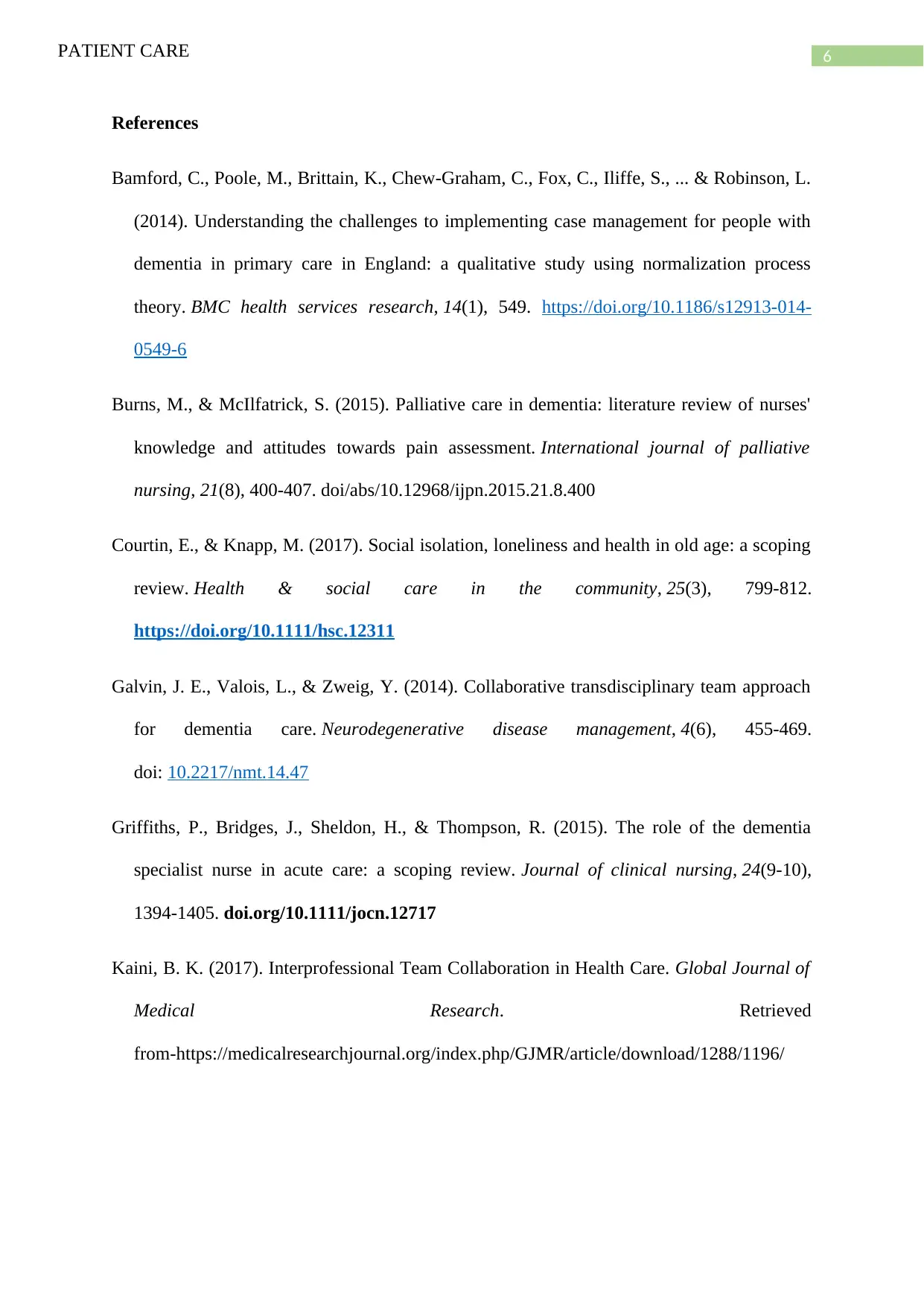
6PATIENT CARE
References
Bamford, C., Poole, M., Brittain, K., Chew-Graham, C., Fox, C., Iliffe, S., ... & Robinson, L.
(2014). Understanding the challenges to implementing case management for people with
dementia in primary care in England: a qualitative study using normalization process
theory. BMC health services research, 14(1), 549. https://doi.org/10.1186/s12913-014-
0549-6
Burns, M., & McIlfatrick, S. (2015). Palliative care in dementia: literature review of nurses'
knowledge and attitudes towards pain assessment. International journal of palliative
nursing, 21(8), 400-407. doi/abs/10.12968/ijpn.2015.21.8.400
Courtin, E., & Knapp, M. (2017). Social isolation, loneliness and health in old age: a scoping
review. Health & social care in the community, 25(3), 799-812.
https://doi.org/10.1111/hsc.12311
Galvin, J. E., Valois, L., & Zweig, Y. (2014). Collaborative transdisciplinary team approach
for dementia care. Neurodegenerative disease management, 4(6), 455-469.
doi: 10.2217/nmt.14.47
Griffiths, P., Bridges, J., Sheldon, H., & Thompson, R. (2015). The role of the dementia
specialist nurse in acute care: a scoping review. Journal of clinical nursing, 24(9-10),
1394-1405. doi.org/10.1111/jocn.12717
Kaini, B. K. (2017). Interprofessional Team Collaboration in Health Care. Global Journal of
Medical Research. Retrieved
from-https://medicalresearchjournal.org/index.php/GJMR/article/download/1288/1196/
References
Bamford, C., Poole, M., Brittain, K., Chew-Graham, C., Fox, C., Iliffe, S., ... & Robinson, L.
(2014). Understanding the challenges to implementing case management for people with
dementia in primary care in England: a qualitative study using normalization process
theory. BMC health services research, 14(1), 549. https://doi.org/10.1186/s12913-014-
0549-6
Burns, M., & McIlfatrick, S. (2015). Palliative care in dementia: literature review of nurses'
knowledge and attitudes towards pain assessment. International journal of palliative
nursing, 21(8), 400-407. doi/abs/10.12968/ijpn.2015.21.8.400
Courtin, E., & Knapp, M. (2017). Social isolation, loneliness and health in old age: a scoping
review. Health & social care in the community, 25(3), 799-812.
https://doi.org/10.1111/hsc.12311
Galvin, J. E., Valois, L., & Zweig, Y. (2014). Collaborative transdisciplinary team approach
for dementia care. Neurodegenerative disease management, 4(6), 455-469.
doi: 10.2217/nmt.14.47
Griffiths, P., Bridges, J., Sheldon, H., & Thompson, R. (2015). The role of the dementia
specialist nurse in acute care: a scoping review. Journal of clinical nursing, 24(9-10),
1394-1405. doi.org/10.1111/jocn.12717
Kaini, B. K. (2017). Interprofessional Team Collaboration in Health Care. Global Journal of
Medical Research. Retrieved
from-https://medicalresearchjournal.org/index.php/GJMR/article/download/1288/1196/
Paraphrase This Document
Need a fresh take? Get an instant paraphrase of this document with our AI Paraphraser
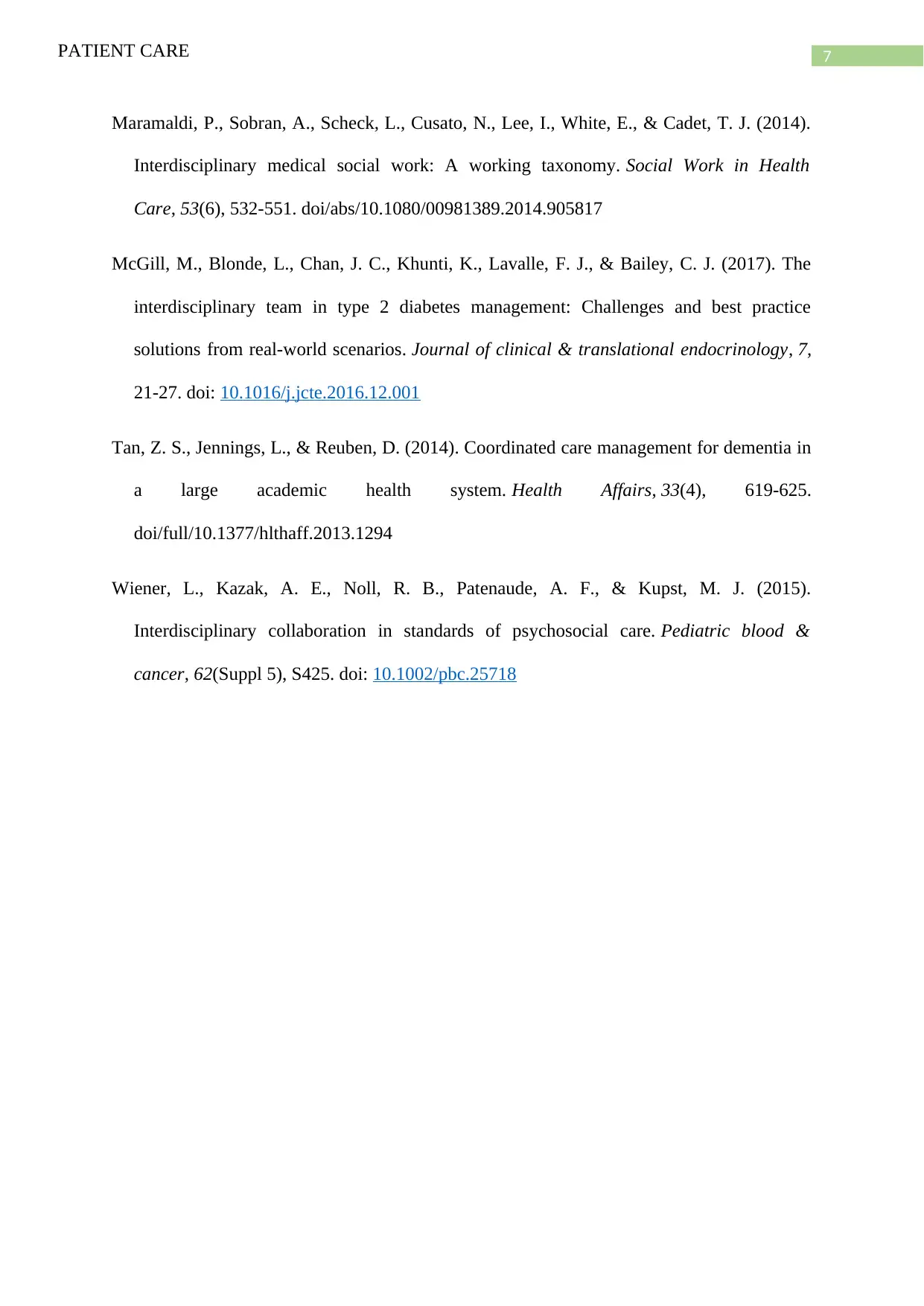
7PATIENT CARE
Maramaldi, P., Sobran, A., Scheck, L., Cusato, N., Lee, I., White, E., & Cadet, T. J. (2014).
Interdisciplinary medical social work: A working taxonomy. Social Work in Health
Care, 53(6), 532-551. doi/abs/10.1080/00981389.2014.905817
McGill, M., Blonde, L., Chan, J. C., Khunti, K., Lavalle, F. J., & Bailey, C. J. (2017). The
interdisciplinary team in type 2 diabetes management: Challenges and best practice
solutions from real-world scenarios. Journal of clinical & translational endocrinology, 7,
21-27. doi: 10.1016/j.jcte.2016.12.001
Tan, Z. S., Jennings, L., & Reuben, D. (2014). Coordinated care management for dementia in
a large academic health system. Health Affairs, 33(4), 619-625.
doi/full/10.1377/hlthaff.2013.1294
Wiener, L., Kazak, A. E., Noll, R. B., Patenaude, A. F., & Kupst, M. J. (2015).
Interdisciplinary collaboration in standards of psychosocial care. Pediatric blood &
cancer, 62(Suppl 5), S425. doi: 10.1002/pbc.25718
Maramaldi, P., Sobran, A., Scheck, L., Cusato, N., Lee, I., White, E., & Cadet, T. J. (2014).
Interdisciplinary medical social work: A working taxonomy. Social Work in Health
Care, 53(6), 532-551. doi/abs/10.1080/00981389.2014.905817
McGill, M., Blonde, L., Chan, J. C., Khunti, K., Lavalle, F. J., & Bailey, C. J. (2017). The
interdisciplinary team in type 2 diabetes management: Challenges and best practice
solutions from real-world scenarios. Journal of clinical & translational endocrinology, 7,
21-27. doi: 10.1016/j.jcte.2016.12.001
Tan, Z. S., Jennings, L., & Reuben, D. (2014). Coordinated care management for dementia in
a large academic health system. Health Affairs, 33(4), 619-625.
doi/full/10.1377/hlthaff.2013.1294
Wiener, L., Kazak, A. E., Noll, R. B., Patenaude, A. F., & Kupst, M. J. (2015).
Interdisciplinary collaboration in standards of psychosocial care. Pediatric blood &
cancer, 62(Suppl 5), S425. doi: 10.1002/pbc.25718
1 out of 8
Related Documents
Your All-in-One AI-Powered Toolkit for Academic Success.
+13062052269
info@desklib.com
Available 24*7 on WhatsApp / Email
![[object Object]](/_next/static/media/star-bottom.7253800d.svg)
Unlock your academic potential
Copyright © 2020–2026 A2Z Services. All Rights Reserved. Developed and managed by ZUCOL.





